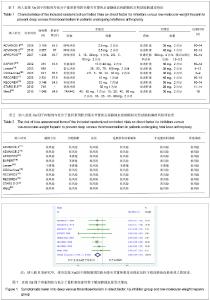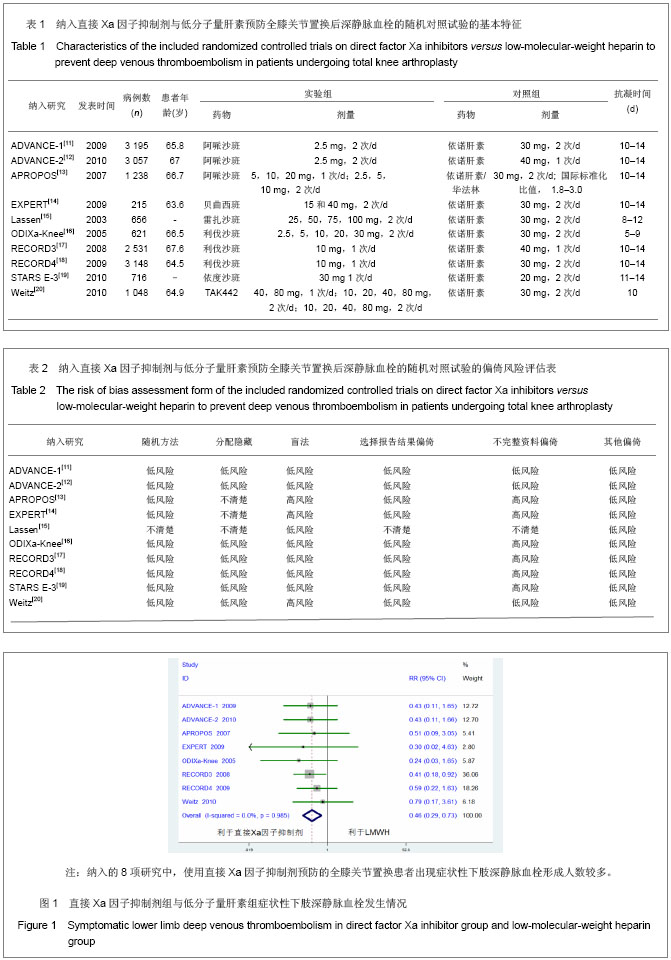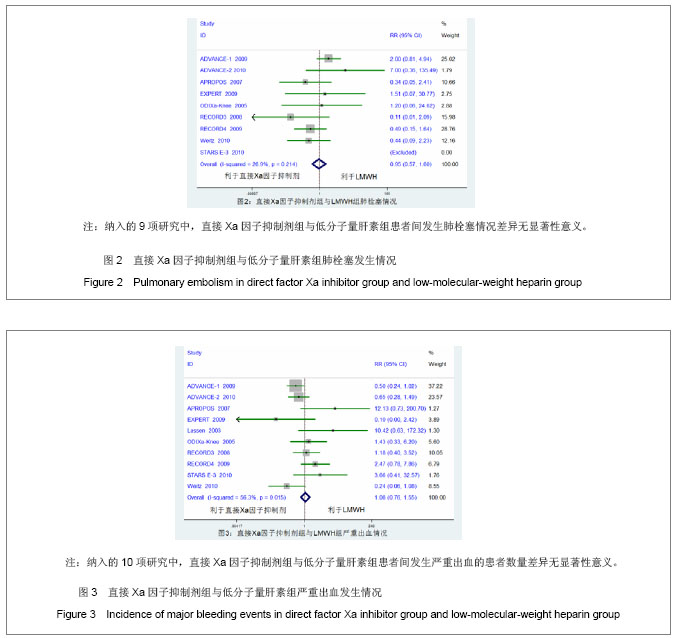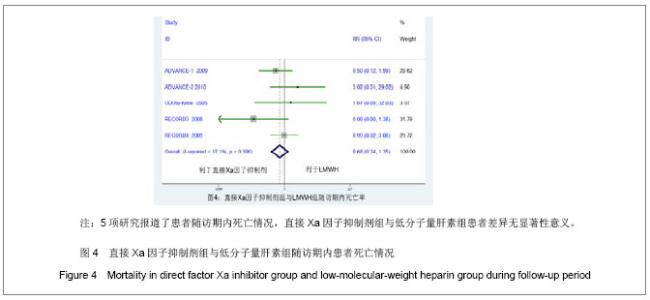Chinese Journal of Tissue Engineering Research ›› 2013, Vol. 17 ›› Issue (17): 3140-3147.doi: 10.3969/j.issn.2095-4344.2013.17.014
Previous Articles Next Articles
Direct factor Xa inhibitors prevent deep venous thromboembolism after total knee arthroplasty: A Meta-analysis
Chen Xue-qing1, Jia Jian2
- 1 Graduate School of Tianjin Medical University, Tianjin 300070, China
2 Department of Orthopedic Trauma, Tianjin Hospital, Tianjin 300211, China
-
Received:2013-01-19Revised:2013-03-15Online:2013-04-23Published:2013-04-23 -
Contact:Jia Jian, Doctor, Chief physician, Professor, Department of Orthopedic Trauma, Tianjin Hospital, Tianjin 300211, China Jiajian1969@yahoo.com.cn -
About author:Chen Xue-qing★, Studying for master’s degree, Attending physician, Graduate School of Tianjin Medical University, Tianjin 300070, China chenxq301800@yahoo.com.cn
CLC Number:
Cite this article
Chen Xue-qing, Jia Jian. Direct factor Xa inhibitors prevent deep venous thromboembolism after total knee arthroplasty: A Meta-analysis[J]. Chinese Journal of Tissue Engineering Research, 2013, 17(17): 3140-3147.
share this article

2.1 检索结果分析 初检文献1 073篇,通过阅读标题、摘要后排除明显不符合要求文献1 046篇,阅读全文排除文献27篇,最终纳入分析文献10篇,计16 425例患者,全部研究的研究对象情况均可比,见表1。 2.2 纳入研究的方法学质量评价 所有纳入的10篇文献均为随机对照试验,除Lassen等[15]的研究未提及随机方法外,其余研究在随机化过程中偏倚风险较低。在所有研究中,3篇文献分配隐藏方案不清楚[8-10],2篇文献未提及盲发或者方法不恰当。在选择性报告结果偏倚方面,除Lassen等[15]的研究不清楚外,其余9项研究均为低风险。在不完整资料偏倚方面仅有2篇文献未低风险[11-12],其余均为高风险或不清楚。全部10项研究均无其他明显的偏倚风险,见表2。 2.3 Meta分析结果 2.3.1 直接Xa因子抑制剂与低分子量肝素预防全膝关节置换后症状性下肢深静脉血栓形成的结果 在纳入的全部随机对照试验中,有8项研究 (n=13 831)报道了症状性下肢深静脉血栓形成发生情况[11-14, 16-18, 20],其中直接Xa因子抑制剂组(n=7 544)中共35例患者发生症状性下肢深静脉血栓形成,低分子量肝素组(n=6 287)发生症状性下肢深静脉血栓形成数量为51例,差异有显著性意义(P=0.000 7),见图1。"


2.3.2 直接Xa因子抑制剂组与低分子量肝素组发生肺栓塞的情况 共计9项研究(n=14 425)报道了肺栓塞情况[11-14, 16-20],结果显示直接Xa因子抑制剂组 (n=7 843)共发生32例肺栓塞,低分子量肝素组 (n=6 582)出现肺栓塞的患者数量为23例。 直接Xa因子抑制剂组与低分子量肝素组间发生肺栓塞患者数量的差异无显著性意义(P=0.97),见图2。 2.3.3 直接Xa因子抑制剂组与低分子量肝素组发生严重出血的情况 全部10项研究均报道了严重出血情况[11-20],直接Xa因子抑制剂组(n=9 151)共有94例患者发生严重出血,而低分子量肝素组(n=6 931)出现严重出血的患者数量为53例。 直接Xa因子抑制剂组与低分子量肝素组间发生严重出血患者数量差异无显著性意义(P=0.56),见图3。 2.3.4 直接Xa因子抑制剂组与低分子量肝素组患者随访期内死亡情况 5项研究(n=11 861)报道了患者随访期内死亡情况[11-12, 16-18],直接Xa因子抑制剂组共15例患者死亡,而低分子量肝素组出现死亡的患者数量为19例。 直接Xa因子抑制剂组与低分子量肝素组间发生死亡的患者数量组间差异无显著性意义(P=0.27),见图4。"

| [1] Colwell CW Jr. Rationale for thromboprophylaxis in lower joint arthroplasty. Am J Orthop (Belle Mead NJ). 2007;36(9 Suppl): 11-13.[2] Dahl OE. Continuing out-of-hospital prophylaxis following major orthopaedic surgery: what now? Haemostasis. 2000;30 Suppl 2:82-83,101-105.[3] Ma YH, Zhang S. Zhongguo Xiandai Yixue Zazhi. 2010;7(12):7.马云辉,张寿.骨科深静脉血栓形成药物预防的研究进展[J].中国现代医学杂志,2010,7(12):7.[4] Edelsberg J, Ollendorf D, Oster G. Venous thromboembolism following major orthopedic surgery: review of epidemiology and economics. Am J Health Syst Pharm. 2001;58 Suppl 2: S4-13.[5] Chinese Society of Orthopedics. Zhonghua Chuangshang Guje Zazhi. 2012;14(6):1-3.中华医学会骨科学分会创伤骨科学组.中国骨科创伤患者围手术期静脉血栓栓塞症预防的专家共识[J].中华创伤骨科杂志, 2012,14(6):1-3.[6] Fu ZH. Shiyong Yiyao Zazhi. 2003;20(12):941-942.付志厚.髋膝关节置换术后下肢深静脉血栓形成的防治[J].实用医药杂志,2003,20(12):941-942.[7] Li XL. Lu WJ, YU NS, et al. Zhonghua Chuangshang Guke Zazhi. 2000;3(1):37-39.李晓林,卢伟杰,余楠生,等.低分子量肝素预防髋膝术后下肢深静脉血栓形成[J].中华创伤骨科杂志,2000,3(1):37-39.[8] Miric A, Lombardi P, Sculco TP. Deep vein thrombosis prophylaxis: a comprehensive approach for total hip and total knee arthroplasty patient populations. Am J Orthop (Belle Mead NJ). 2000;29(4):269-274.[9] Jing GW, Ye SN, Yang SH. Zhongguo Zuzhi Gongcheng Yanjiu yu Linchuang Kangfu. 2011;15(22):4028-4031.靖光武,叶树楠,杨述华.髋关节置换后利伐沙班与低分子肝素预防下肢深静脉血栓的比较[J].中国组织工程研究与临床康复, 2011,15(22):4028-4031.[10] Tian GX, Wei WL, Zhang L. Zhongguo Xunzheng Xinxueguan Yixue Zazhi. 2011;3(5):403-406.田国祥,魏万林,张灵.后华法林时代口服抗凝新秀:达比加群、利伐沙班、阿哌沙班[J].中国循证心血管医学杂志,2011,3(5):403-406.[11] Lassen MR, Raskob GE, Gallus A, et al. Apixaban or enoxaparin for thromboprophylaxis after knee replacement. N Engl J Med. 2009;361(6):594-604. [12] Lassen MR, Raskob GE, Gallus A, et al. Apixaban versus enoxaparin for thromboprophylaxis after knee replacement (ADVANCE-2): a randomised double-blind trial. Lancet. 2010; 375(9717):807-815.[13] Lassen MR, Davidson BL, Gallus A, et al. The efficacy and safety of apixaban, an oral, direct factor Xa inhibitor, as thromboprophylaxis in patients following total knee replacement. J Thromb Haemost. 2007;5(12):2368-2375.[14] Turpie AG, Bauer KA, Davidson BL, et al. A randomized evaluation of betrixaban, an oral factor Xa inhibitor, for prevention of thromboembolic events after total knee replacement (EXPERT). Thromb Haemost. 2009;101(1): 68-76.[15] Lassen MR, Davidson BL, Gallus A, et al. A phase II randomized, double-blind, ?ve-arm, parallel-group, dose-response study of a new oral directly-acting factor Xa inhibitor, razaxaban, for the prevention of deep vein thrombosis in knee replacement surgery-on behalf of the razaxaban investigators. Blood. 2003;102(11 Pt 1):15a.[16] Turpie AG, Fisher WD, Bauer KA, et al. BAY 59-7939: an oral, direct factor Xa inhibitor for the prevention of venous thromboembolism in patients after total knee replacement. A phase II dose-ranging study. J Thromb Haemost. 2005;3(11): 2479-2486.[17] Lassen MR, Ageno W, Borris LC, et al. Rivaroxaban versus enoxaparin for thromboprophylaxis after total knee arthroplasty. N Engl J Med. 2008;358(26):2776-2786.[18] Turpie AG, Lassen MR, Davidson BL, et al. Rivaroxaban versus enoxaparin for thromboprophylaxis after total knee arthroplasty (RECORD4): a randomised trial. Lancet. 2009;373(9676):1673-1680. [19] Fuji T, Wang C, Fujita S, et al. Edoxaban versus enoxaparin for thromboprophylaxis after total knee replacement: the STARS E-3 trial. Milan: 21st International Congress on Thrombosis, 2010.[20] Weitz JI, Cao C, Eriksson BI, et al. A dose-finding study with TAK-442, an oral factor Xa inhibitor, in patients undergoing elective total knee replacement surgery. Thromb Haemost. 2010;104(6):1150-1157. [21] Li PJ, Gao YL, Wang DC, et al. Zhongguo Jiaoxing Waike Zazhi. 2012;20(11):998-1000.李佩佳,高玉镭,王东辰,等.利伐沙班与低分子肝素在预防人工全膝关节置换术后深静脉血栓形成的分析[J].中国矫形外科杂志,2012,20(11):998-1000.[22] Ji SJ, Zhou YX. Guoji Guke Xue Zazhi. 2010;31(6):336-339.及松洁,周一新.假体设计和手术技术对全膝关节置换术后关节活动的影响[J].国际骨科学杂志,2010,31(6):336-339.[23] Wang WH, Tian SQ, Zhang CL, et al. Zhongguo Jiaoxing Waike Zazhi. 2012;20(7):598-602.王文浩,田少奇,张才龙,等.同期双侧与单侧全膝关节置换治疗膝骨关节炎的比较[J].中国矫形外科杂志,2012,20(7):598-602.[24] Tian H. Linchuang Yaowu Zhiliao Zazho. 2009;7(3):3134.田华.关节置换术后深静脉血栓形成的预防与治疗[J].临床药物治疗杂志,2009,7(3):3134.[25] Yan WQ, Wang K, Han SS, et al. Zhonghua Guanjie Waike Zazhi. 2012;6(2):37-39.严文琪,王凯,韩生寿,等.利伐沙班预防高原红细胞增多症患者全膝关节置换术后深静脉血栓发生的临床研究[J].中华关节外科杂志,2012,6(2):37-39.[26] Wang GH, Shen DS, Xiong W. Zhongguo Xinyao Zazhi. 2009; 18(6):494-496.王国华,申东升,熊维.抗凝血新药利伐沙班[J].中国新药杂志, 2009,18(6):494-496.[27] Eikelboom JW, Weitz JI. Selective factor Xa inhibition for thromboprophylaxis. Lancet. 2008;372(9632):6-8. [28] Qu D. Qilu Yaoshi. 2012;31(2):102-104.曲迪.抗凝血Xa因子直接抑制药研究进展[J].齐鲁药事,2012, 31(2):102-104. |
| [1] | Huang Dengcheng, Wang Zhike, Cao Xuewei. Comparison of the short-term efficacy of extracorporeal shock wave therapy for middle-aged and elderly knee osteoarthritis: a meta-analysis [J]. Chinese Journal of Tissue Engineering Research, 2021, 25(9): 1471-1476. |
| [2] | Wang Jinjun, Deng Zengfa, Liu Kang, He Zhiyong, Yu Xinping, Liang Jianji, Li Chen, Guo Zhouyang. Hemostatic effect and safety of intravenous drip of tranexamic acid combined with topical application of cocktail containing tranexamic acid in total knee arthroplasty [J]. Chinese Journal of Tissue Engineering Research, 2021, 25(9): 1356-1361. |
| [3] | Chen Junming, Yue Chen, He Peilin, Zhang Juntao, Sun Moyuan, Liu Youwen. Hip arthroplasty versus proximal femoral nail antirotation for intertrochanteric fractures in older adults: a meta-analysis [J]. Chinese Journal of Tissue Engineering Research, 2021, 25(9): 1452-1457. |
| [4] | Chen Jinping, Li Kui, Chen Qian, Guo Haoran, Zhang Yingbo, Wei Peng. Meta-analysis of the efficacy and safety of tranexamic acid in open spinal surgery [J]. Chinese Journal of Tissue Engineering Research, 2021, 25(9): 1458-1464. |
| [5] | Hu Kai, Qiao Xiaohong, Zhang Yonghong, Wang Dong, Qin Sihe. Treatment of displaced intra-articular calcaneal fractures with cannulated screws and plates: a meta-analysis of 15 randomized controlled trials [J]. Chinese Journal of Tissue Engineering Research, 2021, 25(9): 1465-1470. |
| [6] | Wang Yongsheng, Wu Yang, Li Yanchun. Effect of acute high-intensity exercise on appetite hormones in adults: a meta-analysis [J]. Chinese Journal of Tissue Engineering Research, 2021, 25(8): 1305-1312. |
| [7] | Kong Desheng, He Jingjing, Feng Baofeng, Guo Ruiyun, Asiamah Ernest Amponsah, Lü Fei, Zhang Shuhan, Zhang Xiaolin, Ma Jun, Cui Huixian. Efficacy of mesenchymal stem cells in the spinal cord injury of large animal models: a meta-analysis [J]. Chinese Journal of Tissue Engineering Research, 2021, 25(7): 1142-1148. |
| [8] | Zhao Zhongyi, Li Yongzhen, Chen Feng, Ji Aiyu. Comparison of total knee arthroplasty and unicompartmental knee arthroplasty in treatment of traumatic osteoarthritis [J]. Chinese Journal of Tissue Engineering Research, 2021, 25(6): 854-859. |
| [9] | Yuan Jun, Yang Jiafu. Hemostatic effect of topical tranexamic acid infiltration in cementless total knee arthroplasty [J]. Chinese Journal of Tissue Engineering Research, 2021, 25(6): 873-877. |
| [10] | Huang Dengcheng, Wang Zhike, Cao Xuewei. Intravenous, topical tranexamic acid alone or their combination in total knee arthroplasty: a meta-analysis of randomized controlled trials [J]. Chinese Journal of Tissue Engineering Research, 2021, 25(6): 948-956. |
| [11] | Li Yan, Wang Pei, Deng Donghuan, Yan Wei, Li Lei, Jiang Hongjiang. Electroacupuncture for pain control after total knee arthroplasty: a meta-analysis [J]. Chinese Journal of Tissue Engineering Research, 2021, 25(6): 957-963. |
| [12] | He Xiangzhong, Chen Haiyun, Liu Jun, Lü Yang, Pan Jianke, Yang Wenbin, He Jingwen, Huang Junhan. Platelet-rich plasma combined with microfracture versus microfracture in the treatment of knee cartilage lesions: a meta-analysis [J]. Chinese Journal of Tissue Engineering Research, 2021, 25(6): 964-969. |
| [13] | Hua Haotian, Zhao Wenyu, Zhang Lei, Bai Wenbo, Wang Xinwei. Meta-analysis of clinical efficacy and safety of antibiotic artificial bone in the treatment of chronic osteomyelitis [J]. Chinese Journal of Tissue Engineering Research, 2021, 25(6): 970-976. |
| [14] | Zhan Fangbiao, Cheng Jun, Zou Xinsen, Long Jie, Xie Lizhong, Deng Qianrong. Intraoperative intravenous application of tranexamic acid reduces perioperative bleeding in multilevel posterior spinal surgery: a meta-analysis [J]. Chinese Journal of Tissue Engineering Research, 2021, 25(6): 977-984. |
| [15] | Zhong Yuanming, Wan Tong, Zhong Xifeng, Wu Zhuotan, He Bingkun, Wu Sixian. Meta-analysis of the efficacy and safety of percutaneous curved vertebroplasty and unilateral pedicle approach percutaneous vertebroplasty in the treatment of osteoporotic vertebral compression fracture [J]. Chinese Journal of Tissue Engineering Research, 2021, 25(3): 456-462. |
| Viewed | ||||||
|
Full text |
|
|||||
|
Abstract |
|
|||||

